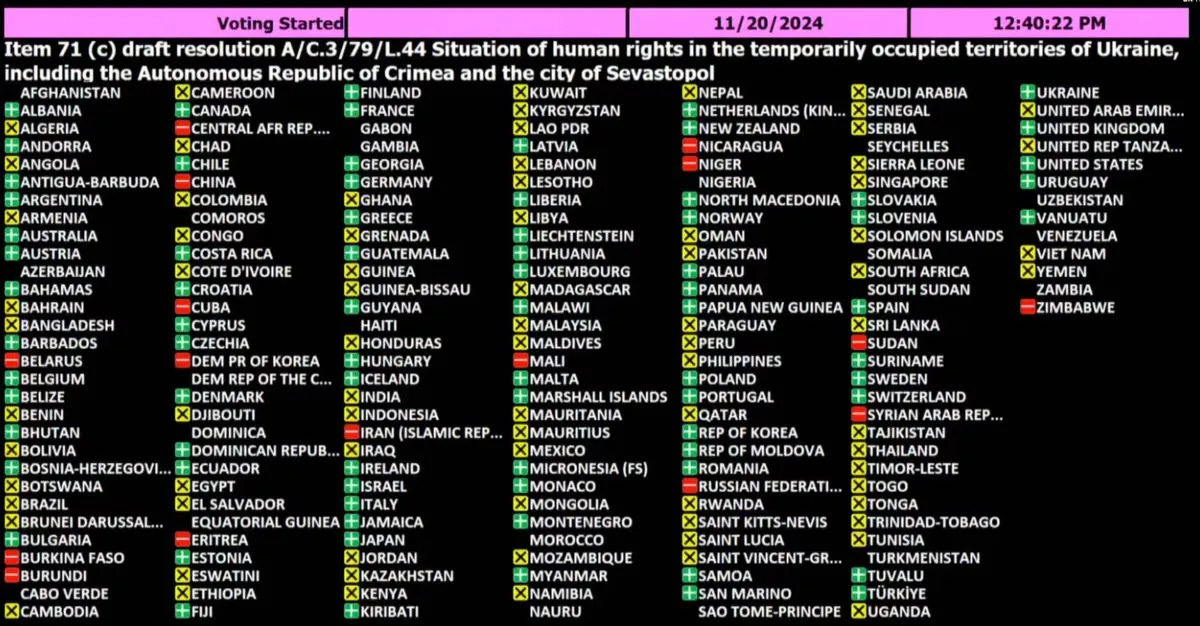UN Committee supports updated resolution on human rights violations in the occupied regions of Ukraine and torture of prisoners of war
Kyiv • UNN
The Third Committee of the UN General Assembly has approved a resolution on human rights violations in the occupied territories of Ukraine. The document was supported by 78 countries, condemning the occupation and containing new provisions on prisoners of war.

The Third Committee of the UN General Assembly, which deals with social and humanitarian issues, as well as human rights, supported the resolution proposed by Ukraine on human rights violations in the temporarily occupied territories, including Crimea and Sevastopol. UNN writes about this with reference to the Voice of America.
Details
The document condemns russia's occupation of Ukrainian territories, including Crimea, parts of Kherson, Zaporizhzhia, Donetsk and Luhansk regions. The resolution was supported by 78 countries, 16 countries voted against, and 78 abstained.

The publication notes that this is the ninth year in a row that the General Assembly has adopted this resolution on human rights violations in Crimea with amendments. According to Ukraine's permanent representative to the UN, Sergiy Kyslytsya, the russians put pressure on other countries to abstain from voting. According to the diplomat, russia even "traded its support for some countries in the elections" in exchange for their willingness to abstain from voting on the new resolution.
According to Serhiy Kyslytsya, one of the important novelties of this year's resolution is a more specific description of the situation around Ukrainian prisoners of war. The text of the document contains torture, as well as other violations of international humanitarian law in relation to prisoners of war. For example, terrible conditions of detention, murders, and extrajudicial executions.
The resolution also calls on international organizations, in particular the International Committee of the Red Cross, to work more persistently in the context of prisoners of war.
Last year, the resolution mentioned civilian hostages for the first time, which gave impetus to the investigation of crimes against them. The situation was reflected in the Secretary-General's annual report on human rights violations in the temporarily occupied territories, which was published in the summer, as well as in the report of the UN Independent International Commission of Inquiry on Violations in Ukraine.
The head of the Crimean Human Rights Group, Olga Skrypnyk, hopes that the inclusion of a description of the situation around prisoners of war in the resolution will help civilian hostages, as many of them are held together with prisoners of war. According to her, this will also oblige the Secretary-General to pay attention to this point in his next report.
The resolution also contains all the crimes that russia commits against Ukrainian children in the temporarily occupied territories. These include the eradication of identity, forced passportization, militarization of education, and deportation.
Kyslytsia notes that for Ukraine, the most important thing is that the resolution obliges the UN Secretary-General to continue working on annual reports on russia's human rights violations. This provides verification of the facts and recognition of these crimes by the international community.
It is also the resolution that approves the General Assembly's decision to hold an annual debate on the situation in the temporarily occupied territories, which usually takes place in February.
The final approval of this year's resolution by the UN General Assembly will take place in mid-December. Ukrainian diplomats hope that despite Russia's pressure and opposition, the vast majority of UN member states will once again support the document and condemn Russia in the General Assembly.
Recall
Ukraine's Permanent Representative to the UN Office in Geneva, Yevheniya Filipenko , said that putin does not want peace after large-scale air strikes on the energy system. She called on allies to provide additional military assistance and increase diplomatic pressure on russia.
UN approves interim aid plan for Ukraine worth more than $2 billion20.11.24, 16:33 • 21656 views